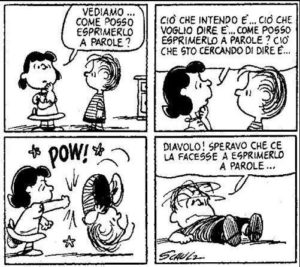The joyous joy of emotions: anger
Online family point : we continue the examination of emotions with the psychologist of our listening desk.
"Another emotion of the merry-go-round is anger, whose origin some authors place in the first semester of life acknowledging as its precursor the reaction to frustration.
Let's see better what we mean.
In the first days of life if the child is stuck in a movement manifests a widespread response of agitation, determined by a high accumulation of activation. However, one cannot speak of real anger because it lacks the "criterion of meaning", that is, the attribution of meaning to the context and experience. To get to this, the development of cognitive skills will be necessary to allow the child to make an assessment of the situation lived.
This is very important, because experiences of anger arise when the person perceives a precise intentionality and responsibility in those who caused the damage. It's clear, then, that anger, as well as every emotion, is not directly affected by external events, but it comes from the meaning that we give him.
As a result, the importance of people's attribution styles (that is, explanations that give you an event), their negative automatic thoughts, rigid and generalized beliefs with which they interpret situations and events. That's why, in anger management it becomes relevant to recognize these thoughts and then carry out a verification of the veracity, a comparison with reality data. Other important interventions in anger management include: Training on problem solving and identifying alternative behaviors, on the ability to take the other's point of view (perspective taking) and teaching relaxation techniques to control physiological activation.
So, the adaptive function of anger lies in the instinct to defend oneself, responding to an injustice suffered or perceived, perception of the violation of one's rights and may indicate the presence of an obstacle to achieving the goals that the individual aims at.
The Anger becomes dysfunctional for the person if his expression compromises his social relations or leads him to perform harmful actions towards himself, others, or towards things.
Who knows the Peanuts, knows that Lucy is convinced that she has been downgraded to a second-rate role in the family and considers her brother the main culprit, reo to be born.
Lucy, also, as seen from the vignette, has great difficulties in managing anger.
It seems that between the identification of alternative ways of expressing anger and dysfunctional thoughts to be refused, Lucy has quite a bit’ work on itself."
Dr Nicoletta Serra
Psychologist Psychotherapist Point Family Acli
Bibliography
Schaffer R. H. (2005), Developmental psychology. An introduction, Rffaello Cortina Publisher
Gavazzi I. G. (2009), Psychology of emotional development, The Mill
Roll D. (2005), Short dictionary of developmental and education psychology, Carocci publisher
Cagliari, 2 September 2020




 Italiano
Italiano English
English Français
Français Español
Español






